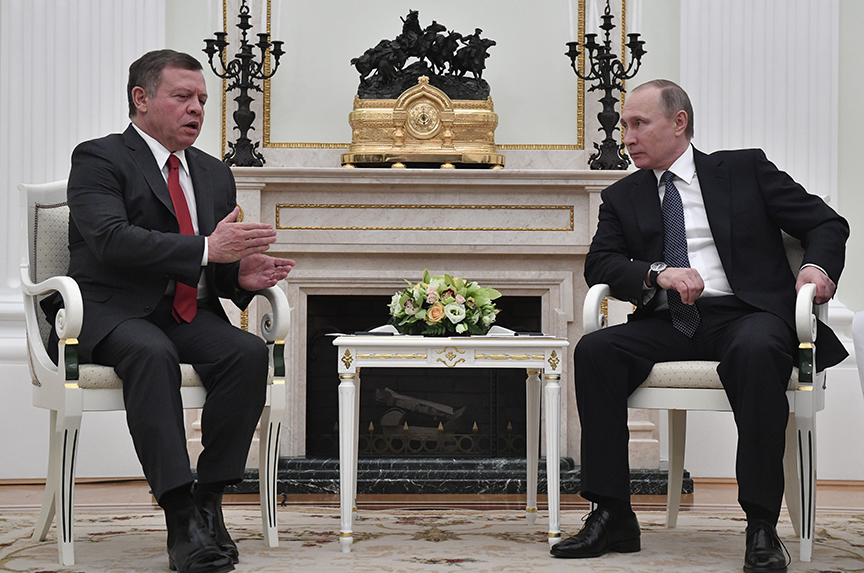 On March 29, Jordan will host the Arab League summit amid chaos across the Middle East. There is speculation that Russia and Egypt are pressing the Arab League to invite Syrian President Bashar al-Assad to the summit in light of reports that Syrian military officers have visited Jordan and Egypt over the past few weeks. Assad’s presence at the summit could bring about a sea change in Syria’s relationship with a host of other Arab states.
On March 29, Jordan will host the Arab League summit amid chaos across the Middle East. There is speculation that Russia and Egypt are pressing the Arab League to invite Syrian President Bashar al-Assad to the summit in light of reports that Syrian military officers have visited Jordan and Egypt over the past few weeks. Assad’s presence at the summit could bring about a sea change in Syria’s relationship with a host of other Arab states.
Jordanian King Abdullah II, Egyptian President Abdel Fattah al-Sisi, and Russian President Vladimir Putin are working (either together or separately) to spearhead moves aimed at bringing about the Arab community’s reacceptance of Assad six years after the twenty-two-member Arab League expelled Syria over the war in that country. These three leaders hope to see a historic handshake between Assad and Saudi King Salman bin Abdulaziz as a symbol of reconciliation between Damascus and Riyadh. Though Arab summits face many challenges and rarely end up with fruitful outcomes, Jordan is doing its best to bring all the parties to the table to settle conflicts that erupted during the Arab Spring uprisings across the Middle East and North Africa in 2011.
The Amman summit will test the Hashemite kingdom and its leadership in many ways with a range of topics on the table such as global terrorism; the crises in Libya, Syria, and Yemen; and the Middle East peace process.
Jordan’s king will face six main challenges as he strives to ease tensions between Arab states.
The first challenge relates to Russia’s increased presence in the Middle East. To what extent is there agreement among the Arab states about Moscow’s stepped up involvement in Middle Eastern and North African security crises? Following Russian military action in Syria, which enabled Assad’s army to reconquer Aleppo and other parts of the war-torn country, Moscow appears to be eyeing a greater role for itself in Libya where the Kremlin has lent support to Gen. Khalifa Haftar and his forces in the east which are loyal to the country’s Tobruk-based government, not the ineffectual and fragile albeit internationally-recognized and Western-backed one in Tripoli.
The tension between the Sunni Arab world’s two major powers—Saudi Arabia and Egypt—represents Abdullah’s second challenge. In both the Saudi and Egyptian media there have been campaigns against the other, which have heightened tension in the Cairo-Riyadh relationship. Jordan’s king is known for his diplomatic craftsmanship in brokering reconciliation between countries. He hopes to remove the barriers to improving the Egyptian-Saudi relationship.
The third challenge is how to cope with the fallout from the battles for Mosul and Raqqa. These decisive battles in Iraq and Syria, respectively, will impose a huge burden on Jordan with respect to border security. As Jordan is a gatekeeper to the Gulf Arab nations, the Hashemite kingdom’s ability to protect itself from terrorists on the other side of its Iraqi and Syrian borders is of importance to its allies in the Gulf Cooperation Council (GCC).
Abdullah’s fourth challenge pertains to Iraqi-GCC relations. Reconciling ties between the Gulf Arab monarchies and Baghdad, especially while Iranian-backed Shi’ite militias are present in Iraq, will be no easy task. As far as many in the GCC are concerned, Iraq has, since Saddam Hussein’s ouster following a US-led invasion in 2003, come under Iran’s geopolitical influence. At the same time, the Shia-led government in Baghdad often accuses some Gulf Arab states of sponsoring the Islamic State of Iraq and al-Sham (ISIS) and al Qaeda—accusations that are echoed by some Western governments.
The fifth challenge for Abdullah is the heavy economic burden on Jordan as a result of the influx of refugees fleeing regional conflicts. According to the United Nations Refugee Agency, there are more than 650,000 Syrian refugees in Jordan. Jordan was already hosting Iraqi refugees who fled following Hussein’s ouster in 2003 and Palestinians who fled during the Arab-Israeli wars of the 20th century. Other Arab League states, including Lebanon, Iraq, and Egypt face similar challenges as a result of the war in Syria.
The sixth challenge, and perhaps the most daunting, is that of working with the new administration of US President Donald Trump on the Israeli-Palestinian peace process. Jordan’s leadership is paying close to attention to the White House’s position on Jewish settlements, rhetoric on moving the US Embassy from Tel Aviv to Jerusalem, and Israeli pressure to end US support for a two-state solution. Jordan’s minister of state for media affairs, Mohammad Momani, said a decision to move the US Embassy to Jerusalem would be a “red line” for Amman, “inflame the Islamic and Arab streets,” and serve as a “gift to extremists.”
The Arab League summit’s success depends on avoiding any preset agendas and ready-made recommendations. The leaders must engage in a constructive dialogue and rise up to the challenge of denying extremists the means to shift the region towards further radicalism.
Shehab al-Makahleh (Sam Mak) is a senior advisor at Gulf State Analytics with experience as a political advisor in the United Arab Emirates.
Image: Jordan’s King Abdullah II met Russian President Vladimir Putin at the Kremlin in Moscow on January 25. (Reuters/Alexander Nemenov)
